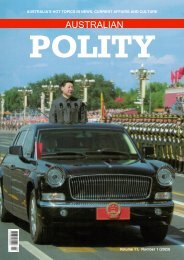Australian Polity, Volume 10 Number 1 & 2
March 2022 issue of Australian Polity
March 2022 issue of Australian Polity
- No tags were found...
You also want an ePaper? Increase the reach of your titles
YUMPU automatically turns print PDFs into web optimized ePapers that Google loves.
Geoffrey Blainey’s famous reference to ‘the tyranny
of distance’ – the title of his 1966 history - may
resonate less today than it did with previous
generations of Australians. In a world of increasingly
rapid international transport and almost instantaneous
communications, the sense of isolation has markedly
decreased in recent decades, although covid travel
restrictions resurrected an historical consciousness of
remoteness.
trade routes. Any substantial interference to that stability
is a threat to our security and prosperity.
Recent events suggest that stability is being challenged.
While ongoing terrorism cannot be underestimated, and
ethnic conflicts will continue to simmer in various places,
the major threat is from China which has been pushing its
influence in Australia’s Pacific neighbourhood - in Tonga,
Samoa, Fiji, the Solomons Kiribati and PNG.
Reflecting on the significant changes wrought by World
War II, Blainey wrote of the Indo Pacific neighbourhood:
‘The new Asian nations had more vigorous nationalism
and far more acute social and economic problems than
the average European nation. Australia, after existing in
secure isolation for more than a century, had drifted into
a new orbit of dangers and uncertainties.’ The war proved
that isolation exposed vulnerabilities. The Japanese
naval commander, Admiral Yamamoto’s plans to cut off
Australia’s communications and supplies from the US by
establishing control of the South Pacific were never fully
realised, but his forces inflicted severe damage, sinking
the American fleet at Pearl Harbour and establishing a
perimeter from PNG across the ocean. He was driven
back in the Coral Sea. If his plans to control the Pacific
Islands had succeeded, Australia would have been left
in an even more dangerous predicament. The Japanese
forces were driven from the region by the allies, but
the ‘new orbit of dangers and uncertainties’, of which
Blainey wrote has been our reality ever since: conflicts
in Korea, Malaya, Vietnam and Timor Leste; unrest in
Myanmar, Bougainville, Fiji, the Solomon Islands, West
Papua, Indonesia and the Philippines.
Remarkably, Australia put aside old enmities towards
the Japanese people, and established a strong trading
relationship within 15 years of the war. While animosity
lingered for those who had suffered at the hands of
their former enemy, Australia was blessed by post-war
governments which strove to meet the challenges of
a new reality. Our growing personal engagement with
Asia, something that Blainey was unable to observe in
the early 1960s, was built on migration and enhanced
by tourism. Despite this, the geographic reality of the
Pacific remains the same today as it was in the 1940s:
Australia is an isolated continent, significantly dependent
on a peaceful, harmonious region and critical maritime
Tonga fell under the influence of China when taking loans
to rebuild the capital Nuku’alofa, after riots had destroyed
much of it in November 2006. Since then, the Chinese
Communist Party has feted the islanders, offering many
sweeteners to the locals, including training its Olympic
athletes. The Kingdom is one of the largest Chinese
debtors in the region – some two-thirds of the nation’s
debt is owed to China. It had to ask for a restructure of
the loans in 2020 and stands exposed to making further
concessions to the CCP.
By ‘assisting’ Pacific nations to rebuild after regular natural
disasters, China has infiltrated the region. In December,
the envoys of Samoa, Tonga, Fiji, the Federated States
of Micronesia, Solomon Islands and Vanuatu to China
attended the launching ceremony of the China-Pacific
Island Countries Reserve of Emergency Supplies program
in Guangzhou.
Some nations, having observed Tonga’s predicament,
have grown wary of China. The new prime minister of
Samoa cancelled $100 million Chinese-financed project
to expand the island’s seaport after defeating the Beijingaligned
former government.
Concerns have also been raised in Fiji which faces an
election at the end of 2022.The current prime minister,
Frank Baiimarama was courted China following his
military coup in 2006, offering funding through the China-
Pacific Economic and Co-operation Forum. An incident
in October 2021, in which Chinese diplomats gate crashed
a Taiwanese National Day reception in Suva, intimidating
guests and bashing a Taiwanese official, was covered up
by the Fijian government. The revelation of the incident,
which expands the meaning of ‘wolf warrior’, has provided
fuel for opposition leader Sitiveni Rabuka’s campaign
against over-reliance of Beijing.
22 Australian Polity





